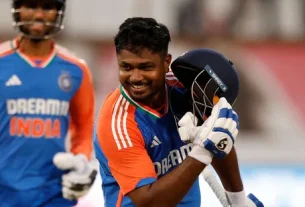Shared News: June 20, 2021 8:09:07 am
Milkha Singh’s gentle and charismatic persona was so infectious that any athlete, blessed with even a brief interaction (or phone call), was left with an indelible feeling of awe and admiration.
PT Usha, who also fnished 4th in the Olympics, said she found solace in Milkha Singh’s words. (Twitter/PTUsha)
Track and field legend Milkha Singh, who passed away on Friday, was the elderly statesman of Indian sport. His gentle and charismatic persona was so infectious that any athlete, blessed with even a brief interaction (or phone call), was left with an indelible feeling of awe and admiration.
His words inspired, motivated, and even comforted heartbroken athletes.
Jugraj Singh, a talented international hockey player whose career was cut short in a car accident – just a few months after his 20th birthday – is just one such athlete who found a renewed enthusiasm towards life after meeting the ‘Flying Sikh.’
“When I had that accident in 2003, Milkha Sir came to meet me and had one simple piece of advice: ‘Don’t give up on life, whatever ups and downs,’” recalls Jugraj, who was left with multiple fractures in the right pelvic, thigh and right elbow after the accident. A few years later the drag-flicker ran into Milkha at a golf course and the quarter-mile legend had only one word of advice for him: “Lage Raho (be relentless).”
Fourth-Placed Club
The great PT Usha and shooter Joydeep Karmakar found solace in Milkha’s advice. Just like Milkha, they finished a close fourth in their respective Olympic events, short by just a whisker.
“He used to just call me ‘PT’,” says Usha, who finished fourth in the 400m hurdles at the 1984 Games in Los Angeles. “He said, ‘PT you are hard-working and dedicated like me. But the reason I could win medals at international competitions in my career was because I could travel abroad and participate in many competitions.’ His advice really helped me,” says Usha who went on to win a record-breaking five golds at the Asian Championships the very next year.
For Karmakar, who finished fourth in the 50m rifle prone event at the 2012 London Olympics, Milkha did not sugar-coat his words. Over the phone he told Karmakar to “live with that pain” but also ensured him that the pain wouldn’t cripple him for life.
“He said, ‘you don’t have to carry it with you at the front of your mind all the time. Eventually, it’ll go away. You can’t forget it, just don’t let it dominate you,’” says Karmakar. “He was jovial. I got from him that whatever problems you have as an athlete, you must laugh it off. Laugh at your own problems. That was a great takeaway,” he adds.
‘He thanked me’
When discus thrower Krishna Poonia ended India’s five-decade track and field gold-medal drought at the Commonwealth Games in 2010, Milkha was elated beyond measure. His 440 yard race in Cardiff in 1958 was India’s first gold in the competition then known as ‘Empire and Commonwealth Games.’ When Poonia stood on the podium, Milkha sprinted down the stairs to reach her and pat her back.
“He was overjoyed,” she recalls. “He said, ‘I was waiting for this day for such a long time. I wanted to see another Indian win a track and field gold at the Commonwealth. Thank you for fulfilling my dreams.’ “That was a surreal feeling. Later we met many times and he would often share stories about his struggles during the Partition,” adds the two-time Asian Games bronze medallist.
A few years later he’d meet India’s star 100m sprinter Dutee Chand, and talk about the common factors they both shared.
“He said he had read about me and watched my race. He said he also came from a very humble background and faced a lot of struggles like me. ‘You are very talented and have the potential to make it big on the athletics circuit’ he told me,” says the 25-year-old.
Athletics – both track and field – wasn’t the only sport Milkha kept tabs on.
Post-retirement he enjoyed playing golf – an avenue even his son Jeev pursued. Though not a professional himself, Milkha never shied away from giving technical advice to golfers.
Harmeet Kahlon, an Arjuna Awardee golfer was one such individual. There was a period in his career when he decided to take a break from the course to re-work his swing action.“He told me not to change my natural style and that was his mantra in his career,” he says.
<h3>Push for greater goals</h3>
For a man who achieved some of the biggest accolades sport had to offer, he remained true to his roots. And that was a perspective he wished no other athlete would lose. Even his son.
Seven-time international golf champion Shiv Kapur remembers visiting Milkha’s home in Chandigarh along with his friend Jeev. “Milkha sir used to tell both of us that we were born with a silver spoon and we don’t understand what the struggles of life are,” he says, asserting it was never with the intentionto always push them to strive for greater goals. “Once Jeev lost a title by one shot in Europe, Milkha sir told Jeev that this will teach him to work more and better and results can wait.”
That kind of push even elevated 2017-18 I-League champions Minerva Punjab.“When we were close to winning the I-league title, I would show the players, including foreign players, the speeches by Milkha sir and his video of winning the gold medal in Cardiff. Everybody felt motivated by hislife story,” says team owner Ranjit Bajaj.“When we won the I-League title, he met the players and told them ‘Chak de phatte.’”




